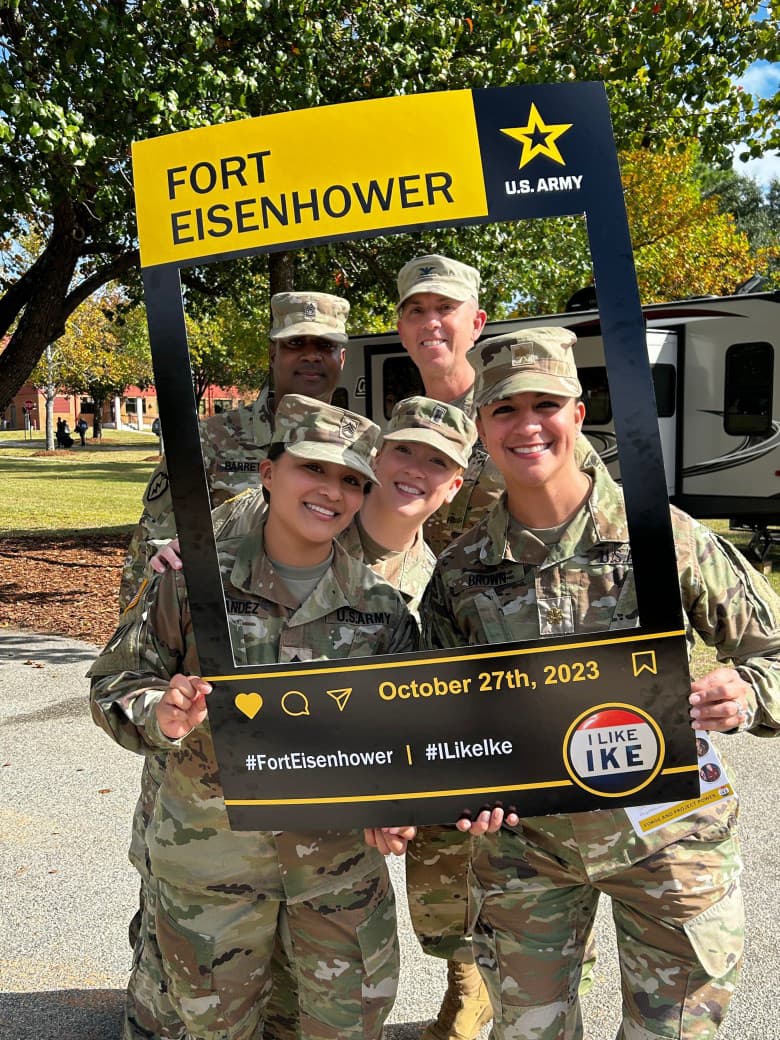The Case for Taking the Hard Jobs
MI officer finds role a challenge, rewarding
Maj. Maribel Brown, U.S. Army Signal School
Article published on: April 1, 2024 in the Army Communicator Spring 2024 Edition
Read Time: < 4 mins

Maj. Maribel Brown, bottom right, poses for a photo with the front office team. (Courtesy photo)
As I prepared to interview for my current position as the executive officer (XO) to the chief of signal, a friend of mine – a retired Army Ranger lieutenant colonel asked me about my career aspirations.
“If you aren’t planning to make general officer, then it’s stupid to take this job,” the Ranger advised me.
Thinking back on our conversation from almost a year ago, I could not disagree with him more. While I do not harbor expectations of pinning a star, serving in this capacity has expanded my knowledge base, forced me out of my comfort zone, and helped me learn things about the Army I was clueless about despite having served for over 20 years.
As officers, we are encouraged, nay required, to seek out key developmental (KD) positions. As a military intelligence officer, working for the Signal Regiment is nowhere in the recommended positions. In fact, being the XO to the chief of intelligence would not be considered KD. This position is described as broadening, and that is exactly what it did for me. Doing this job has taught me that the makings of a good officer are career field agnostic. Whether infantry, cyber, or medical, there are certain attributes that translate across occupations, and that there was much to be learned from my brothers and sisters in the Signal Corps.
A year ago, despite having jumped the radio on multiple airborne operations, I don’t think I could tell you what SINCGARS actually stood for (Single Channel Ground and Airborne Radio System, for the record). Today, I am able to discuss the changing force structure of the Signal Corps with enough acronyms to fill a pot of alphabet soup. Besides the vernacular, I’ve learned to value the ability to communicate. I, like most Soldiers, take the ability to pick up a radio or log onto the network for granted, and I have been blown away by how much training and technical acumen goes into our signal Soldiers. I have learned about the Capability Development and Integration Directorates (CDID) and how they toil to modernize all aspects of our Army. I have learned about how decisions are made amongst Army senior leaders and how one must present information to ensure the message gets through at such high levels.
Besides the educational aspect of this position, I have also been impressed with the esprit de corps that is very much alive in the Signal Corps. As I glance around my workstation typing this article, I see more orange swag than I ever thought possible! Signal personnel are passionate about being part of this team, and that kind of spirit is a testament to the continued heritage of the regiment. Despite my own regimental affiliation, I was welcomed into the team with open arms.
While I will leave this position with many fun memories, the title of this article refers to it as a hard job. And boy, is it! I had a particularly steep learning curve having no signal background, but in discussing with my predecessors, they agree that nothing quite prepares you for this job. It can be almost impossible to manage dozens of general officer-level engagements each week, deconflicting which three-star meeting your boss needs to go to and which he can afford to miss. It can be grueling getting up before 5 a.m. each day to have enough time to work out and take care of my family before taking my first meeting via Teams on the drive into the office. It can be thankless making oneself available to 5:15 a.m. and 10:30 p.m. text messages and phone calls on the weekend when I’m playing with my son. It can be humbling making many mistakes and having to own up to them, while asking more questions of subject matter experts and doing more research on simple concepts than I have ever before in my career.
In short, this job has challenged me to broaden my horizons. The end result of all these discomforts is that even if this job doesn’t enhance my career according to the established regimen of jobs one must take, I believe it has made me a better officer overall.
No matter how long I do stay in the force, I am convinced it has improved me to the point where everyone I interact with for the remainder of my career benefits from my experience as the XO to the chief of signal. I take all those difficulties in the spirit of Charles Dickens: “I have been bent and broken, but – I hope – into a better shape.”
One of the themes for this quarter is about the heritage of the Signal Corps. As an outsider, I see that the pursuit of constant improvement has been a tenant of the Corps all along, and I plan to take that with me to every job I have in the future.